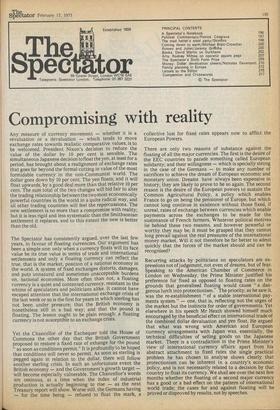Compromising with reality
Any measure of currency movement — whether it is a revaluation or a devaluation — which tends to move exchange rates towards realistic comparative values, is to be welcomed. President Nixon's decision to reduce the value of the dollar by 10 per cent is sensible. The simultaneous Japanese decision to float the yen, at least for a period, has brought about a realignment of exchange rates that goes far beyond the formal cutting in value of the most formidable currency in the non-Communist world. The dollar goes down by 10 per cent. The yen floats; and it will float upwards, by a good deal more than that relative 10 per cent. The sum total of the two changes will bid fair to alter the trading relationship between the two most economically powerful countries in the world in a quite radical way, and all other trading countries will feel the repercussions. The new settlement is no more than a compromise with reality; but it is less rigid and less systematic than the Smithsonian settlement it replaces, and to this extent the new is better than the old.
The Spectator has consistently argued, over the last few years, in favour of floating currencies. Our argument has been a simple one: only when a currency floats will its face value be its true value in terms of trade and international settlemeRts and only a floating currency can reflect the true, that is the market, position of a national economy in the world. A system of fixed exchanges distorts, damages, and puts unnatural and sometimes unacceptable burdens on, national economies. More often than not, a floating currency is a quiet and contented currency, resistant to the whims of speculators and politicians alike. It cannot have escaped attention that the international exchange crisis of the last week or so is the first for years in which sterling has not been under pressure; that the British economy is nonetheless still in a bad way; and that the pound is floating. The lesson ought to be plain enough: a floating currency is not susceptible to an exchange crisis.
Yet the Chancellor of the Exchequer told the House of Commons the other day that the British Government proposed to restore a fixed rate of exhange for the pound "as soon as conditions permit." It is profoundly to be hoped that conditions will never so permit. As soon as sterling is pegged again in relation to the dollar, there will follow another sterling crisis. In such an unfortunate event the British economy — and the Government's growth target — will become especially vulnerable. The Chancellor's words are ominous, at a time when the index of industrial production is actually beginning to rise — as the next Treasury report will show. Worse still, the Germans having — for the time being — refused to float the mark, a collective lust for fixed rates appears now to afflict the European Powers.
There are only two reasons of substance against the floating of all the major currencies. The first is the desire of the EEC countries to parade something called European solidarity; and their willingness — which is specially strong in the case of the Germans — to make any number of sacrifices to achieve the dream of European economic and monetary union. Dreams have always been expensive in history; they are likely to prove to be so again. The second reason is the desire of the European powers to sustain the Common Agricultural Policy, a policy which enables France to go on being the pensioner of Europe, but which cannot long continue in existence without those fixed, if unreal, rates of exchange between currencies which enable payments across the exchanges to be made for the sustenance of French farmers, Whatever political motives lie behind these two reasons, and however powerful or worthy they may be, it must be grasped that they cannot long prevail against the real pressures of the international money market. Will it not therefore be far better to admit quickly that the forces of the market should and can be recognised?
Recurring attacks by politicians on speculators are expressions not of judgement, not even of dreams, but of fear.
Speaking to the American Chamber of Commerce in London on Wednesday, the Prime Minister justified t is preference for fixed as opposed to floating rates on the grounds that generalised floating would cause "a dangerous lurch into protectionism." The priority, as he saw it, was the re-establishment "of a stable international payments system" — one, that is, reflecting not the urges of the market but the instincts for order of governments. Yet elsewhere in his speech Mr Heath showed himself much encouraged by the beneficial effect on international trade of the combined dollar devaluation and yen float. He argued that what was wrong with American and European currency arrangements with Japan was, essentially, the technical difficulties of selling goods on the Japanese market. There is a contradiction in the Prime Minister's view of international currency affairs: apart from his abstract attachment to fixed rates the single practical problem he has chosen to analyse shows clearly that protectionism can be inherent in a country's economic policy, and is not necessarily related to a decision by that country to float its currency. We shall see over the next few months whether the floating of a second major currency has a good or a bad effect on the pattern of international world trade; the cases for and against floating will be proved or disproved by results, not by speeches.
































 Previous page
Previous page